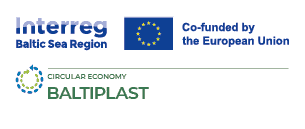
Transforming Schools into Plastic-Free Environments
10 October 2024
The alarming rise of microplastics in our environment means that each person consumes the equivalent of a credit card’s worth every week. To combat this, we must change our habits now to protect our planet, health, and future generations. The Plastic-Free Schools initiative seeks to educate students about replacing plastics with sustainable alternatives, inspiring them to lead the way in transforming consumption patterns.
Highlights from the BALTIPLAST Project
Daugavpils Vienības Elementary School
In collaboration with the Daugavpils City Municipality, the Baltic Environmental Forum Latvia engaged 8th-grade students in a two-week project focused on reducing plastic waste. Students learned to identify various types of plastic and tracked their classroom consumption, adopting sustainable habits through hands-on workshops.
With the aim to educate young minds, BALTIPLAST project offers for classes of various ages an interactive lesson on waste sorting, plastic waste and its impact on the environment. In 2024, more than 10 lessons have been conducted. Pupils are eager to learn and discuss soft measures to reduce plastic waste amounts.
Leuschnerstraße Primary School, Hamburg
In the summer of 2024, over 200 students participated in engaging workshops during a project week on waste and plastics. Activities included making friendship bracelets and decorating reusable bags, all aimed at raising awareness of plastic pollution. Students also conducted plastic inventories in their classrooms and shared their experiences with parents and teachers.
Valmiera Secondary School of Design and Art
In spring 2024, first-year students at Valmiera Secondary School of Design and Art took part in a month-long plastic waste challenge. They collected and separated plastic waste generated in their school and, after a two-week trial, assessed the types of plastic they used. The students then focused on reducing items like candy wrappers, single-use bags, and plastic bottles over the next two weeks.
The experiment yielded mixed results. Some changes, like refusing plastic bottles, were easy, while others, such as adjusting shopping habits or meal plans, required more effort. The challenge highlighted that lifestyle changes alone aren’t enough—systemic changes are also needed to reduce single-use plastics.
A Call to Action for Schools
To effectively reduce plastic pollution, it is crucial for schools to engage all stakeholders. Here are some practical steps we recommend for schools to take:
- Provide Reusable Water Bottles: Stop selling single-use plastic bottles and encourage students to bring reusable ones.
- Organize a Plastic-Free Canteen: Transition back to reusable cutlery, plates, and cups to minimize plastic waste during meals and events.
- Avoid Single-Use Plastic at School Events: Opt for fabric banners and recycled paper decorations instead of plastic, and offer eco-friendly gifts.
- Collaborate with Other Schools: Share success stories and inspire other institutions to take action against plastic pollution.
- Purchase Plastic-Free Items: Choose reusable products and prioritize suppliers that offer sustainable options.
Engaging Teachers and Parents
Teachers can make a significant impact by organizing clean-up events, hosting educational talks on plastic pollution, and incorporating sustainability into the curriculum through creative projects.
Parents can support the initiative by providing plastic-free lunches, using reusable stationery, and discussing plastic pollution’s impact with their children. By cultivating sustainable behaviours, they can cultivate lifelong eco-conscious habits in their children.
Empowering Pupils
Students can lead the charge by conducting plastic audits in their classrooms, organizing educational projects, and committing to personal challenges to reduce disposable items. Documenting and sharing their experiences can further inspire their peers to adopt a plastic-free lifestyle.
The BALTIPLAST project emphasizes the importance of a community-wide effort to combat plastic pollution, beginning in our schools. By fostering awareness and encouraging sustainable practices, we can create a healthier planet for future generations.





